Producers
The people behind our wines are just as diverse as those who drink them. Together, Bordeaux and Germany are forming an entire generation of new and forward-thinking wine producers who value tradition and craft just as much as innovation. Discover remarkable winemakers from Germany and Bordeaux who deserve a spot on your radar below.
Pauline Lurton
Château Reynier
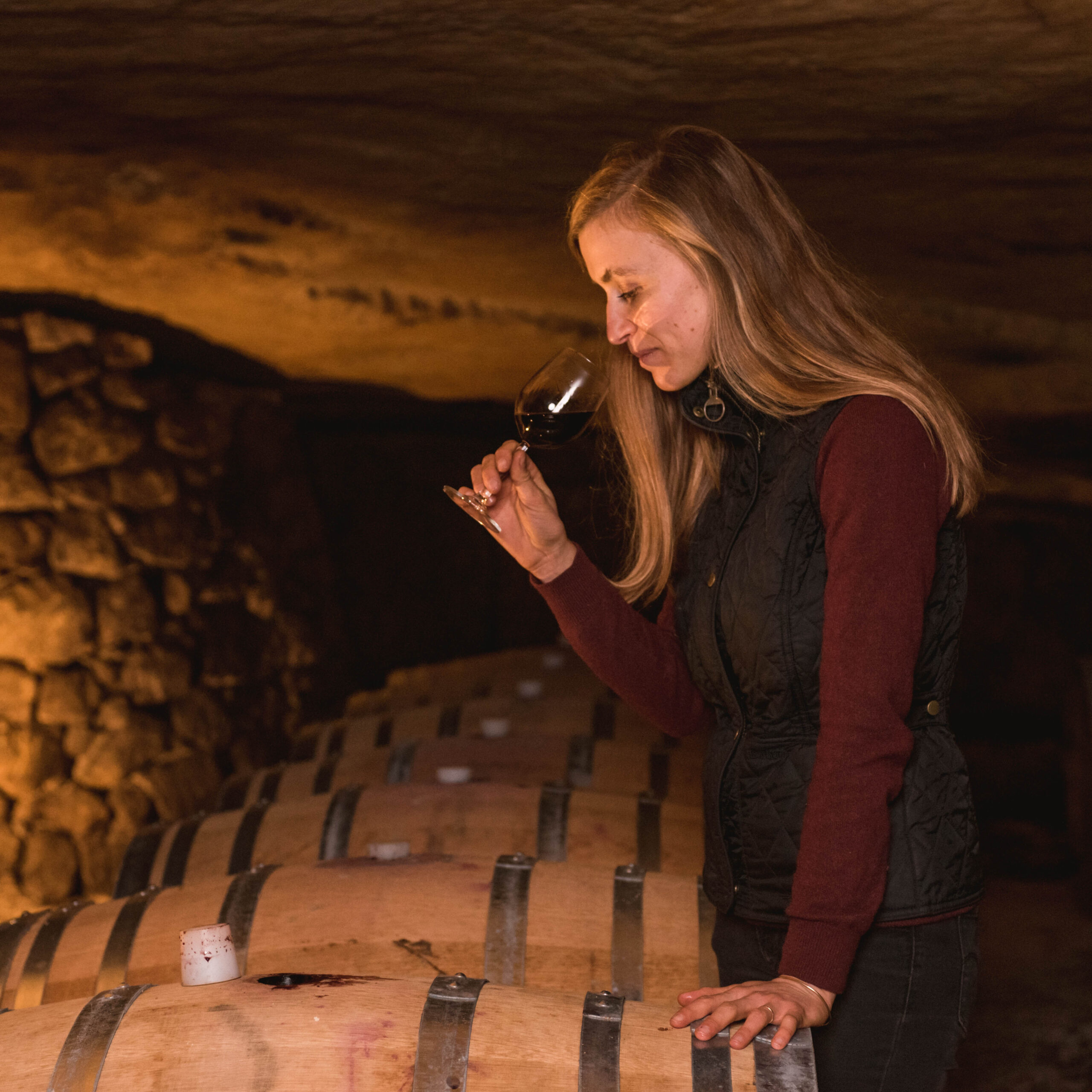
Pauline Lurton
Château Reynier
Château Reynier, one of Bordeaux’s oldest continuously operating wineries, has been family-owned and producing wine since the mid-19th century. Today, the estate is guided by Marc and Agnes Lurton, with their daughter Pauline representing the sixth generation. Marc inherited the château from his father in 1980 and assumed full leadership in 1997.
Pauline’s connection to winemaking began early. Raised among the vines, she spent her childhood helping in the vineyard and cellar, developing both skill and affection for the craft. Beyond wine, she trained as a ballet dancer and even performed with the Boston Ballet before returning to France to attend business school. After gaining work experience in the United States, she returned to the family estate in 2019. Now working closely alongside her parents, Pauline is steadily preparing to carry Château Reynier into its next generation as its future successor.
Andi Weigand
Weingut Weigand
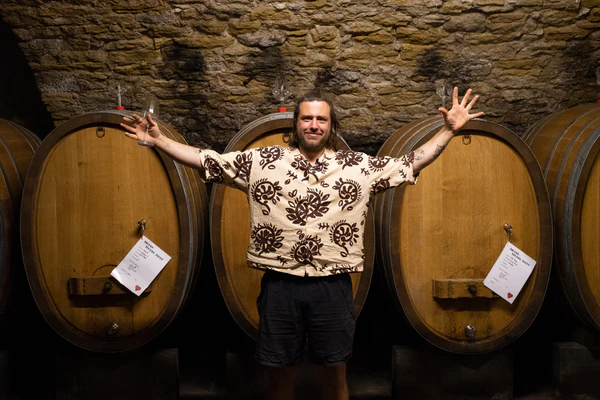
Andi Weigand
Weingut Weigand
In the rolling hills of Iphofen, where vineyards have shaped the landscape for centuries, Andi Weigand is redefining what it means to make wine in Germany. With youthful energy and a dauntless spirit, he has brought natural traditions back to life while charting a progressive path forward.
A second-generation winemaker, Andi took over his father’s estate in 2015. His father had only begun making wine in 1990, and by the time he handed over the vineyards and cellar, Andi was ready to transform the family business. Within two years, the winery was certified organic, and under Andi’s leadership, Weingut Weigand is now regarded as one of the most forward-thinking estates in Germany’s Franken region.
Esther Hermouet
Vignobles Hermouet
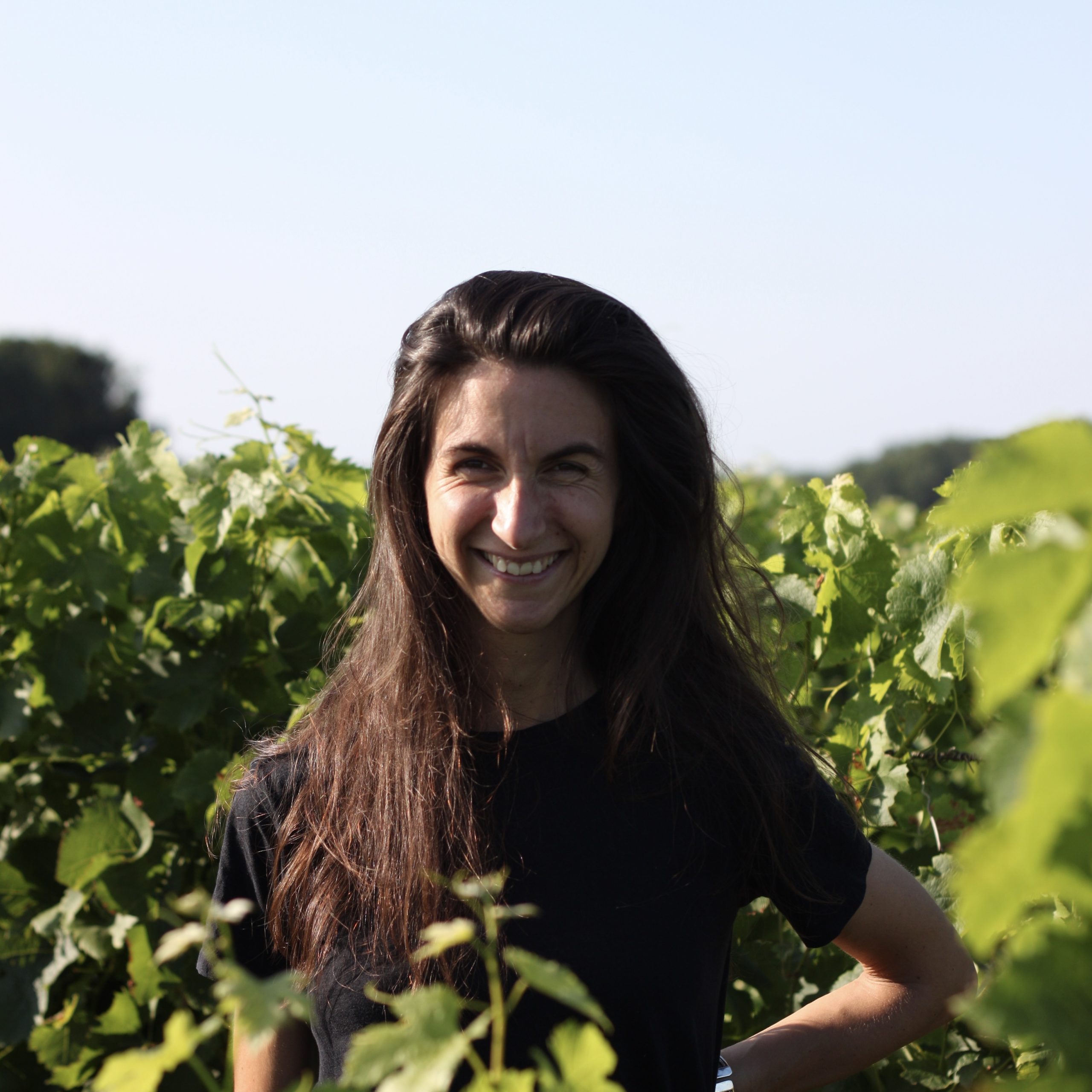
Esther Hermouet
Vignobles Hermouet
Vignobles Hermouet is a family-owned estate rooted in Bordeaux’s Fronsac appellation, home to two properties: Clos du Roy and Château Roc Meynard. Since acquiring them in 1987, the Hermouet family has steadily expanded and revitalized these vineyards through thoughtful, sustainable practices. Their philosophy centers on expressing the unique character of their terroir while embracing continuous refinement.
In 2024, Esther Hermouet returned to Fronsac to lead the estate after a career in international wine marketing with esteemed brands Moët Hennessy, Campari and Champagne Lallier. More than a winemaker, Esther is also a storyteller—capturing the vineyard’s beauty through photography and sharing the craft behind each bottle. Her leadership blends deep-rooted tradition with a modern, creative vision, positioning Vignobles Hermouet to thrive in a rapidly evolving wine market.
Anne Gebert
Weingut Gebert
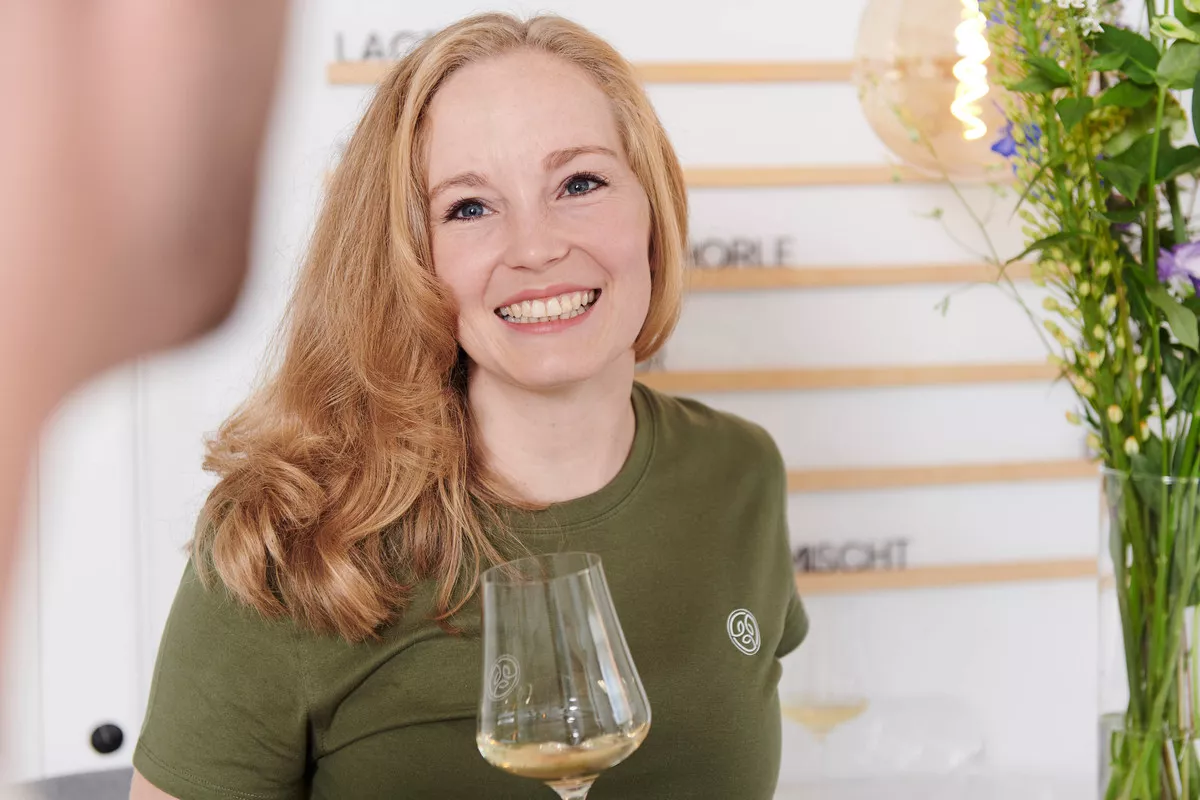
Anne Gebert
Weingut Gebert
Founded in 1825, Weingut Gebert has remained a family-run estate for 200 years, with each generation building on the heritage and expertise of the last. In the fifth generation, Hans-Joachim Gebert managed the property for 30 years, transitioning it from a mixed-use farm to a dedicated wine estate and laying the foundation for its modern vineyard portfolio. Since 2019, his daughter Anne has led the winery’s evolution into a dynamic, team-oriented operation. While rooted in heritage, Weingut Gebert embraces innovation and modern craftsmanship to shape the future of winemaking in Rheinhessen and beyond.
Anne works alongside a close-knit team that reflects the winery’s spirit of “real teamwork.” A true craftsman and exceptional winemaker, Paul Krahl oversees the cellar and brings a breath of fresh air to each vintage. Jan Jansen manages operations and customer relations, while Anne’s sisters, Lara and Hannah, manage the winery’s garden (the Weingarten) and host wine-focused events for consumers. Hans-Joachim remains actively involved, lending his expertise in vineyard care. Together, they carry the family tradition forward with shared purpose and fresh perspective.
Jean Pierre and Pascal Amoreau
Château Le Puy
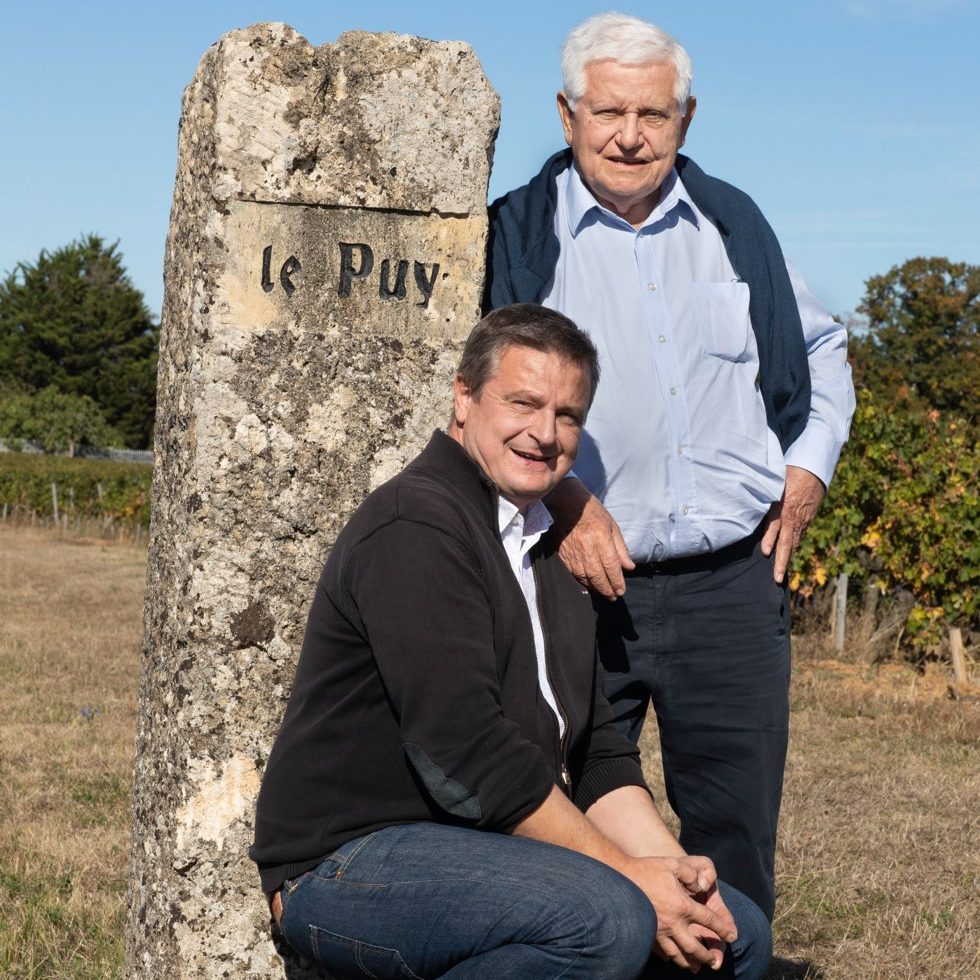
Jean Pierre and Pascal Amoreau
Château Le Puy
Château Le Puy has continuously operated as a family-owned estate since 1610, located in the beautiful Dordogne Valley, part of the Francs Côtes de Bordeaux region. Jean Pierre Amoreau and his son Pascal are the 14th- and 15th-generation winemakers at Château Le Puy in Bordeaux. Situated in the Francs Côtes de Bordeaux appellation, the estate has long stood apart by embracing circularity and biodynamic winemaking methods to craft exceptional terroir-driven wines with distinctive flair.
What truly sets Château Le Puy apart is its commitment to preserving the natural terroir of its land. Central to its approach is a dedication to biodynamics, focusing on creating a sustainable, self-sufficient ecosystem that fosters the healthiest possible environment for the vines. Pascal led the estate to receive its Demeter biodynamic certification in 2013—proof that each red and white Bordeaux blend allows the natural characteristics of the land and grapes to shine.
Matthias Knebel
Weingut Knebel
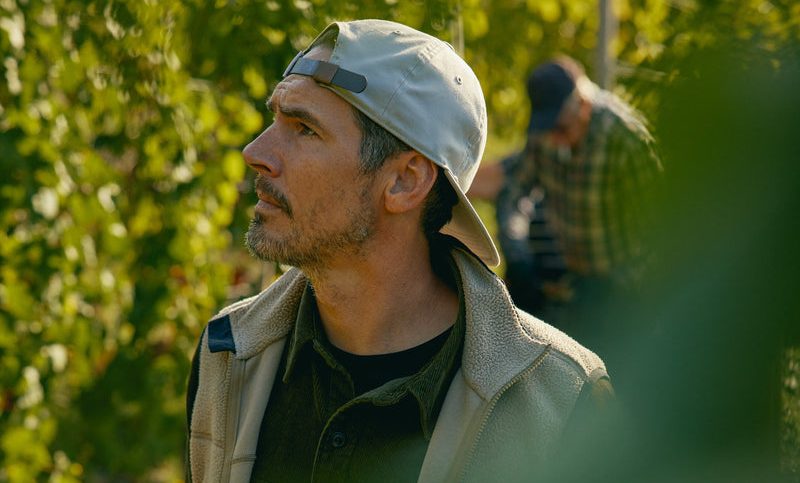
Matthias Knebel
Weingut Knebel
Weingut Knebel, nestled in the picturesque Terrassen-Mosel, boasts a winemaking heritage that dates back to 1642. However, its modern story began in 1989 when Reinhard and Beate Knebel established their own estate in this renowned subregion of the Lower Mosel. In 2008, their son Matthias Knebel took over the reins, and by 2016, his commitment to authentic viticulture and craftsmanship earned the estate membership in the VDP.
Today, Weingut Knebel is celebrated for its exceptional steep-slope Rieslings, prized for their complexity, finesse, and vibrant character. Matthias’s winemaking philosophy is deeply rooted in a respect for nature, allowing the land to express itself fully in every vintage. His low-intervention approach in the cellar—eschewing fining agents and deacidification—lets the wine authentically reflect its terroir. The result is a diverse range of Rieslings, each crafted with the same unwavering dedication to both the Mosel’s unique terroir and the winery’s storied heritage.
Pascale Peyronie
Domaines Peyronie
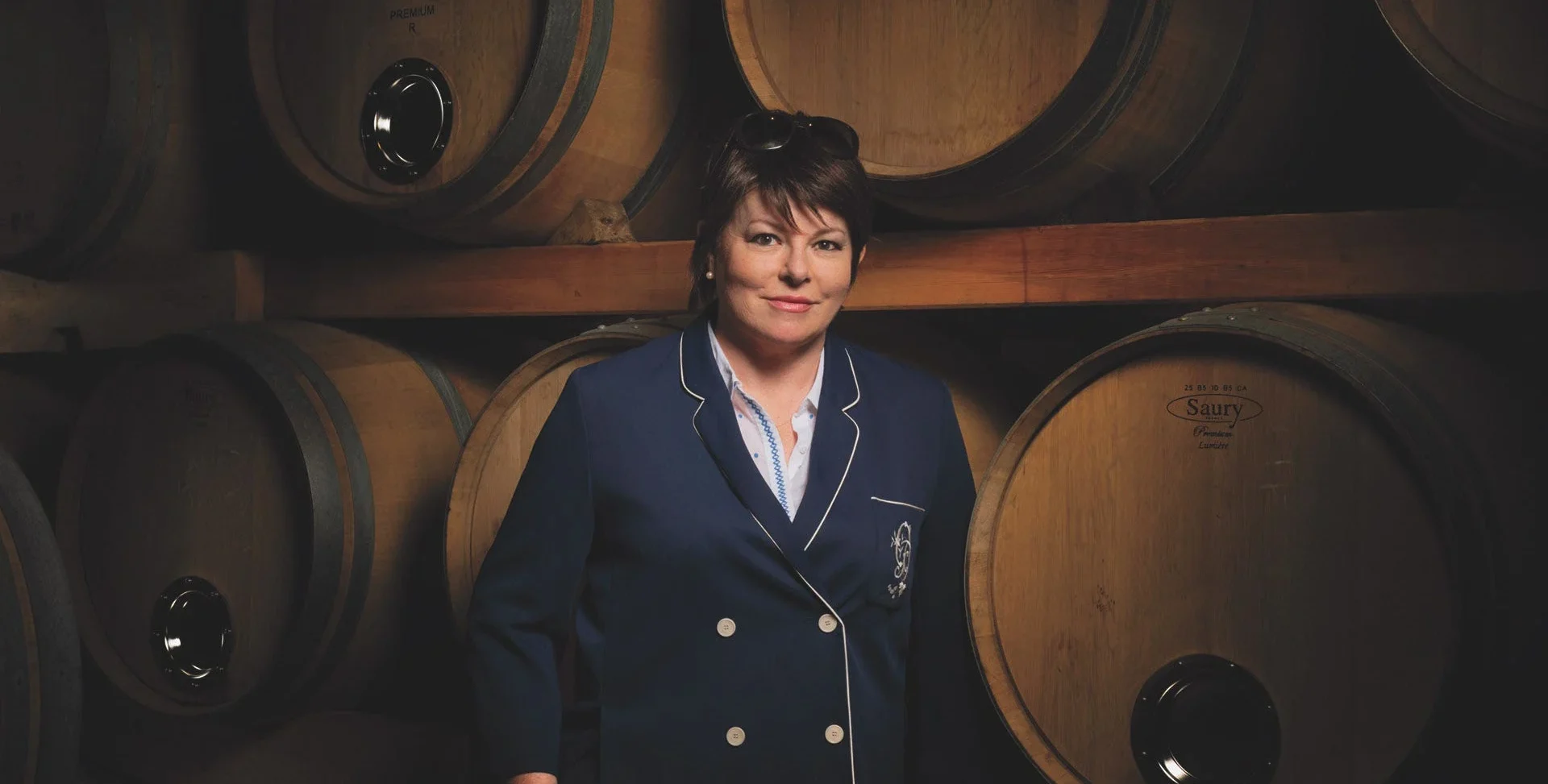
Pascale Peyronie
Domaines Peyronie
Château Fonbadet, the flagship estate of Domaines Peyronie, is located in Pauillac, a renowned sub-appellation of Bordeaux’s Médoc region. Managed by Pascale Peyronie, a fourth-generation winemaker, the estate has been in the family since 1950. Pascale has elevated the estate’s reputation, focusing on sustainability, biodiversity, and traditional hand-harvesting. The vineyard produces a range of grapes, including Cabernet Sauvignon, Merlot, and Malbec, while practicing sustainable farming and biocontrol methods for over two decades.
In 2024, Pascale launched Chartreuse de Fonbadet, a luxurious retreat for wine lovers set within a classic Bordeaux mansion. The retreat features a spa, gym, outdoor pool, and panoramic vineyard views, along with a personal art collection that blends classical and contemporary works, creating a unique fusion of wine and art in the heart of Bordeaux.
Christoph and Johannes Thorle
Weingut Thörle
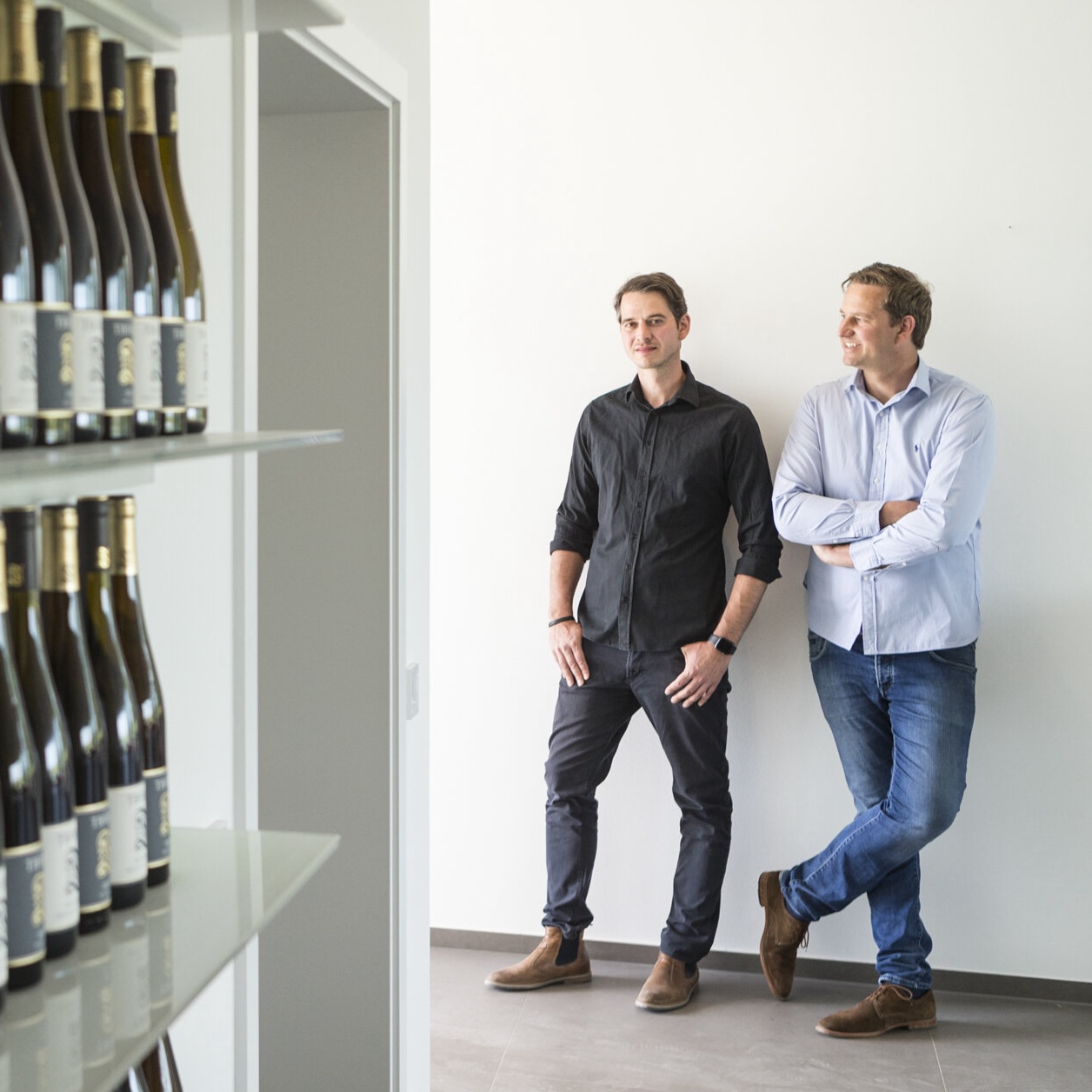
Christoph and Johannes Thorle
Weingut Thörle
Weingut Thörle, situated in the Rheinhessen region, is managed by brothers Christoph and Johannes Thörle. Founded in 1517, the estate has been in their family for generations, and the brothers took the helm in 2006, transforming it into a renowned winery that has elevated the reputation of German wines in the process.
Specializing in certified organic viticulture, the estate employs top-notch equipment and hand-harvesting techniques, focusing primarily on the production of Riesling, Spätburgunder and Silvaner. In 2019, the Thörle brothers unveiled a newly built vinotheque, designed to blend seamlessly into the vineyards and embody the family’s passion for crafting exceptional wines. Today, Weingut Thörle is known as one of the greatest Pinot Noir estates in Germany, continually refining its vinification process to produce wines that are both high quality and vibrant.
Theophile Cordonnier
Château Anthonic

Theophile Cordonnier
Château Anthonic
Château Anthonic is one of the oldest estates in the Bordeaux appellation of Moulis-en-Médoc, with mentions of the estate tracing back to 1850 in the Guide Féret, also referred to as “the bible of Bordeaux.” The property was certified organic in 2019 thanks to the sustainability efforts of the Cordonnier family and was the first vineyard in the Médoc region to introduce agroforestry in 2017.
Since Théophile Cordonnier joined the château in 2020, Château Anthonic has gone through a massive transformation and cemented itself as one of the leading organic, agro-ecological wine estates in Bordeaux.
Andrea Wirsching
Weingut Hans Wirsching
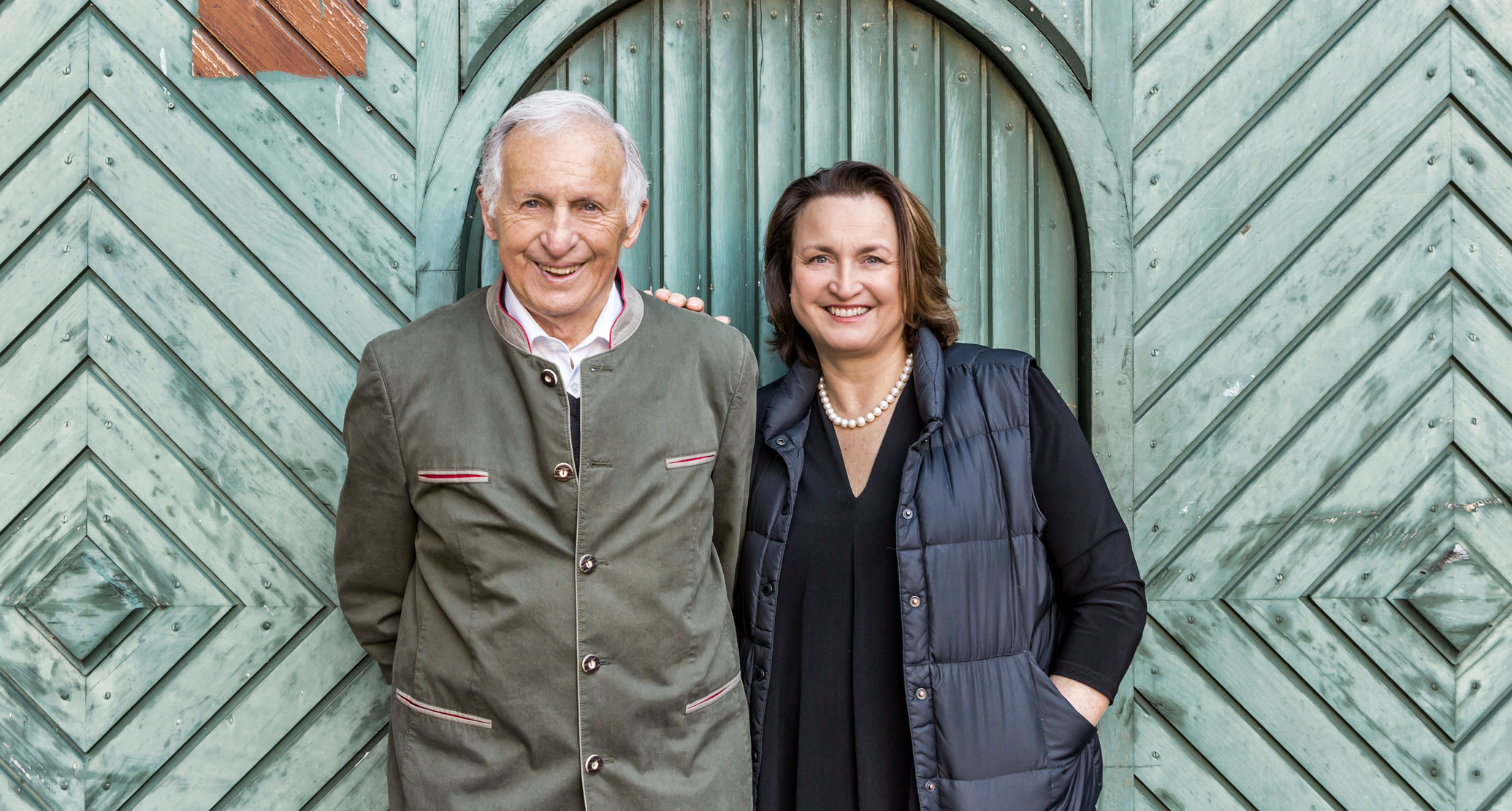
Andrea Wirsching
Weingut Hans Wirsching
Based in the picturesque medieval town of Iphofen in Franken, the Wirschings’ involvement in viticulture dates back to 1528 when the family donated a vineyard to the Abbey at Ebrach. Since 2014, the estate has been managed by Andrea Wirsching, the CEO and 14th generation of the family to oversee the winemaking process.
One of the largest private wineries in Germany, Hans Wirsching produces 37,000 cases of wine each year, 99% of which are dry. Certified for sustainable viticulture, Hans Wirsching prioritizes small quantities of excellent grapes over mass production, combining conventional and organic methods in the vineyards for the best results.
Claire Villars-Lurton
Château Haut-Bages Libéral
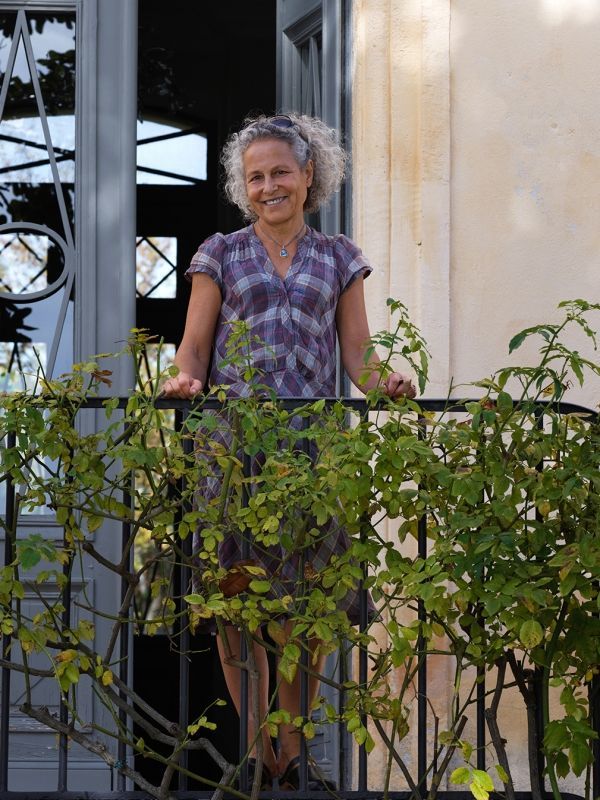
Claire Villars-Lurton
Château Haut-Bages Libéral
Located in Pauillac on the Left Bank of Bordeaux, Château Haut-Bages Libéral has been producing wine since it was owned by the Libéral family in the 18th century. In 1855, the estate was granted the title of Grand Cru Classé, and in 1983, it was purchased by the Villars family, who revitalized the land and returned it to its original glory. Today, the estate is owned by Claire Villars-Lurton.
The third generation of her family to own the estate, Claire is one of the leaders of the agroforestry (the integration of trees and shrubs into farming systems) and agroecology (sustainable farming that works with nature) movement in Bordeaux viticulture.
Konni & Evi
Weingut Konni & Evi
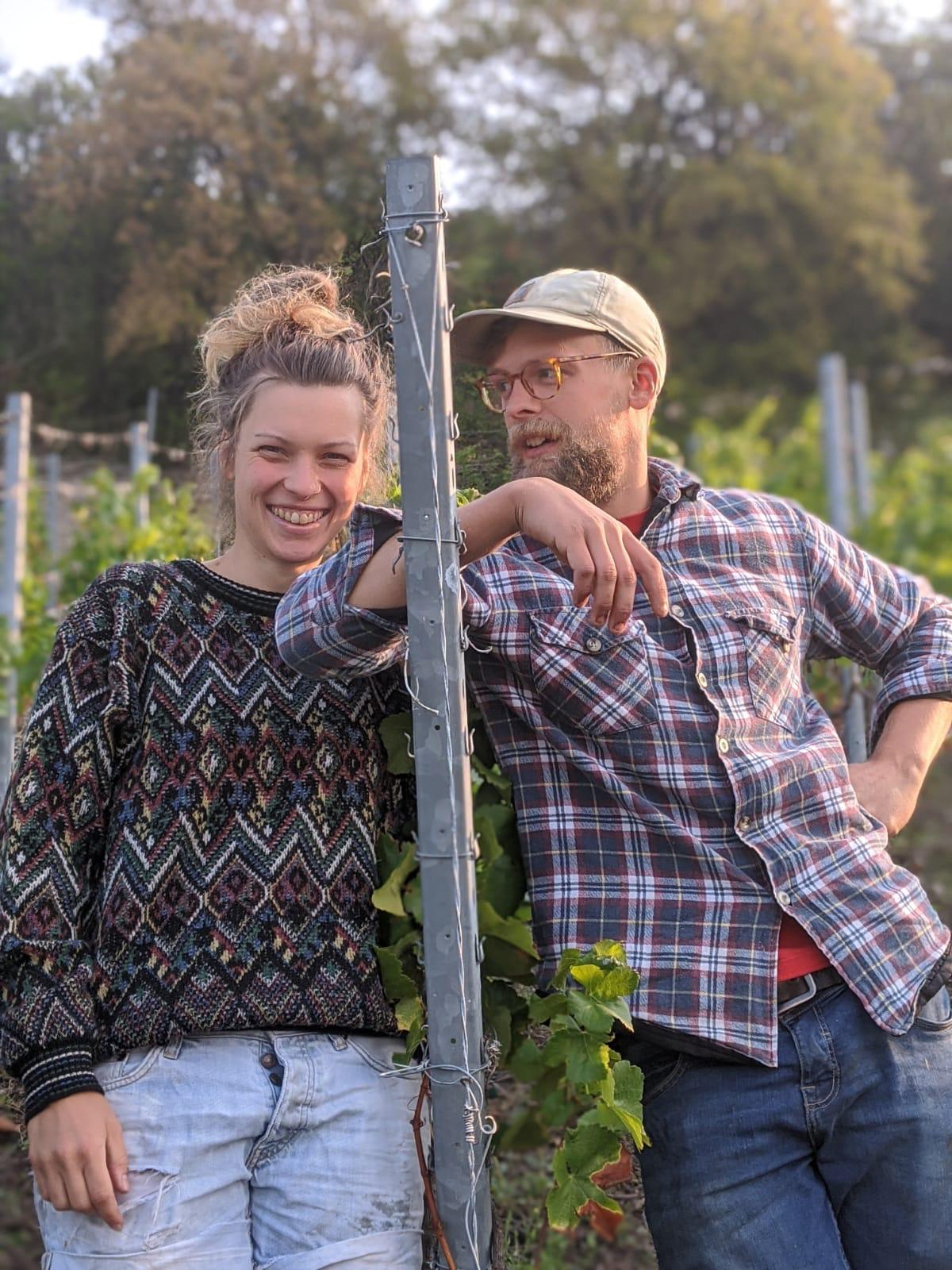
Konni & Evi
Weingut Konni & Evi
While Saale-Unstrut may sound unfamiliar to some, it’s home to centuries of German winemaking history and dedicated vintners. Vines have been cultivated in Germany’s most northerly wine region since AD 998, typically with low yields due to tough growing conditions and conflict in the 20th century.
In the 21st century, came Konni and Evi, local heroes in the return to quality wine from Saale-Unstrut. The couple has continued to work together to make spectacular Saale-Unstrut wines since launching the Konni & Evi brand in 2016, where they are involved in every part of the winemaking process, from vineyard to bottle.
Aline Baly
Château Coutet
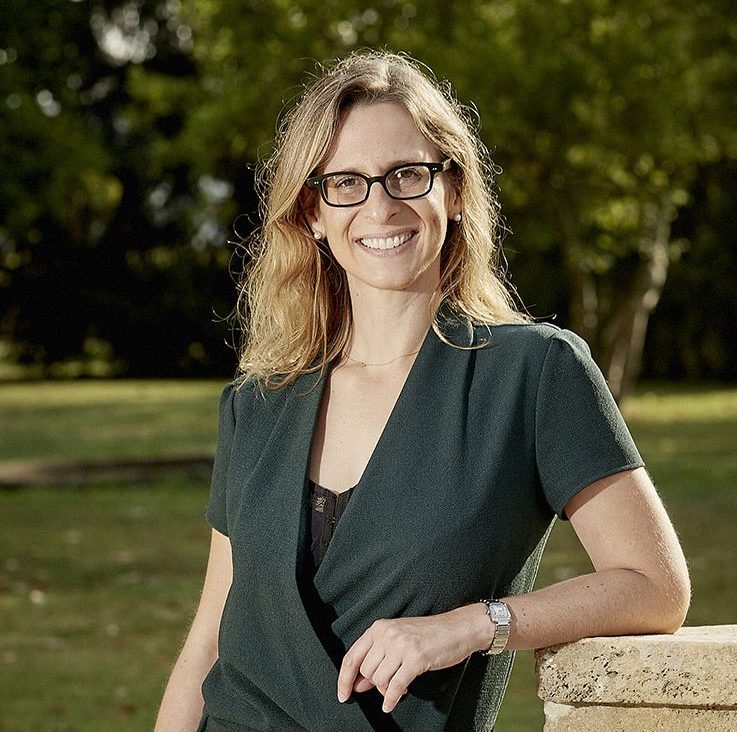
Aline Baly
Château Coutet
Originally from Alsace, the Baly family has managed the Château Coutet vineyard – one of the largest and oldest in Barsac – for two generations. With the help of his two sons, Phillipe and Dominique, Marcel Baly set out to revamp the vineyard and its historic buildings in 1977.
Aline Baly, granddaughter of Marcel, is the most recent member of the Baly family to join the business, though she did not always picture herself following in her family’s footsteps. After a life-changing experience interning with Château Rothschild in 2007, however, Aline resolved to return to the family business. She began working at Château Coutet in 2018, working day-to-day with her uncle and managing the marketing and communications for the estate.
Konrad Salwey
Weingut Salwey
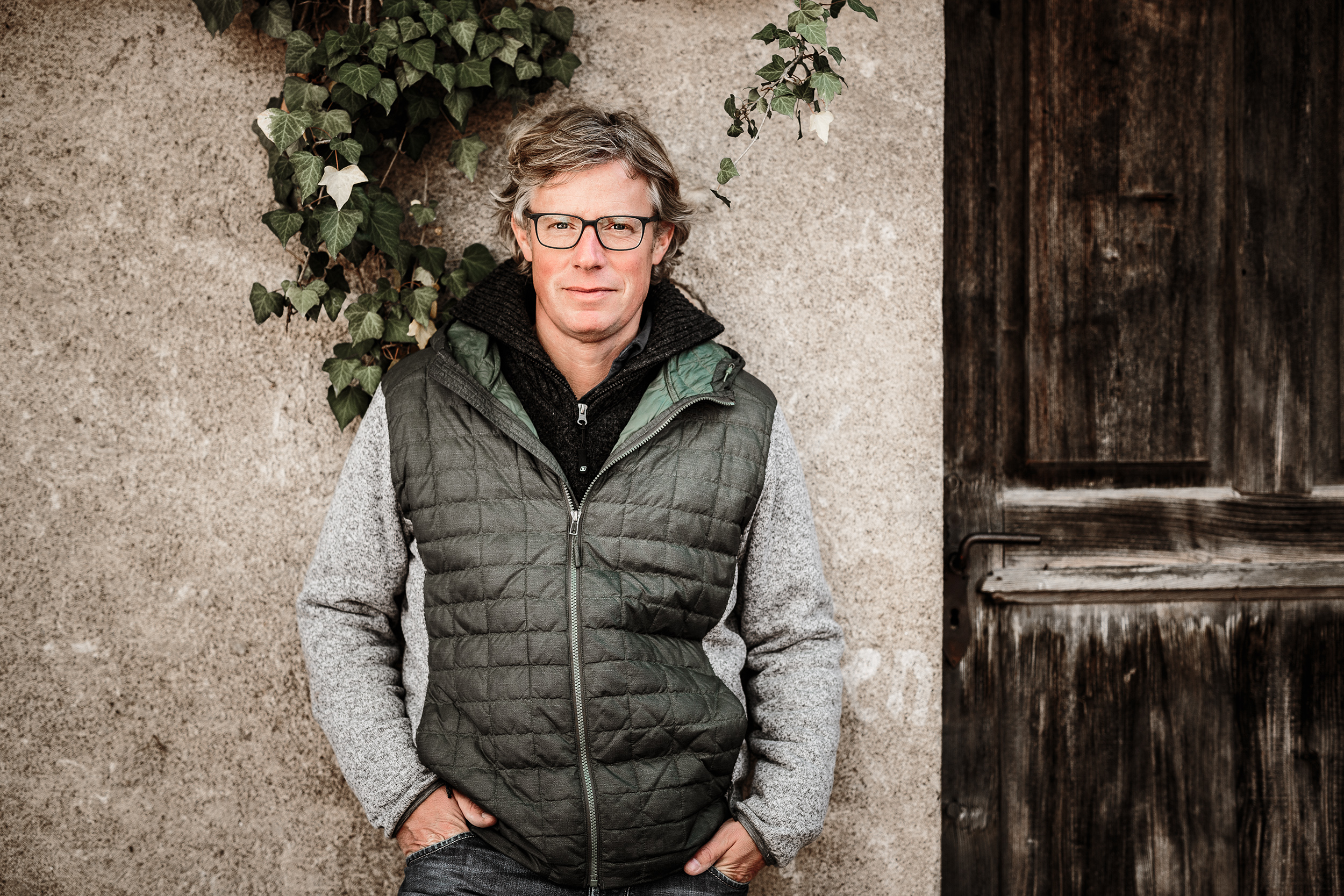
Konrad Salwey
Weingut Salwey
Located in the Kaiserstuhl area of Baden, the Salwey estate sits on top of an extinct volcano in Germany’s most sun-drenched and southernmost region. While the family’s viticultural roots reach back to the 18th century, the name Salwey didn’t join the family-operated winery until three generations ago.
Today, Konrad Salwey is responsible for the strategic direction of the winery, working to maintain the balance of rich tradition and industry-altering innovation. Salwey is best known for experimenting with new techniques and procedures, working to advance the style of vinification.
MARK AND ELODIE MILHADE
Château Recougne
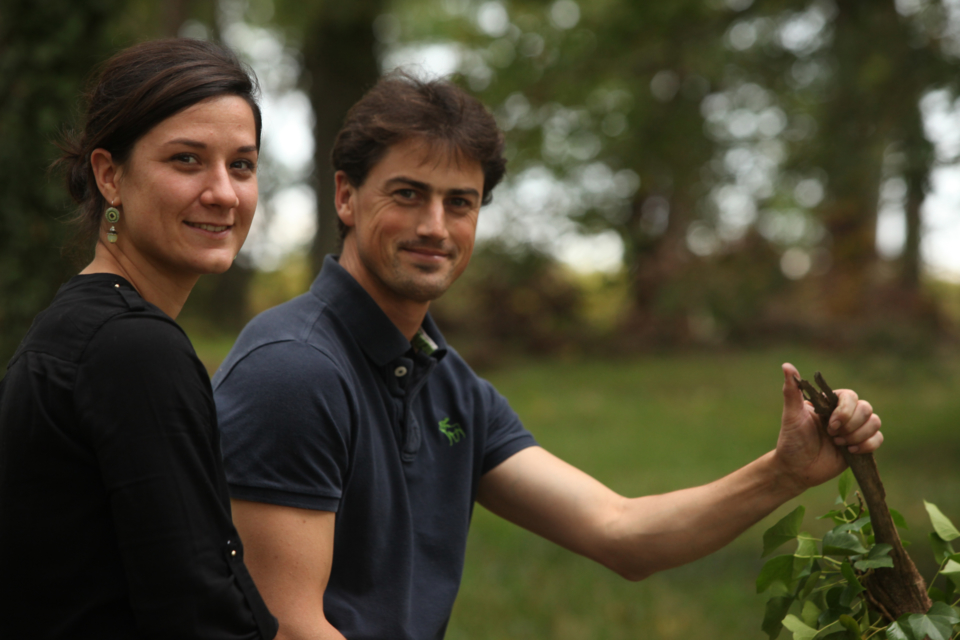
MARK AND ELODIE MILHADE
Château Recougne
The Milhade family established their roots in the Saint-Emilion region of Bordeaux in 1938, beginning with the historic Château Recougne. Well-known in Saint-Emilion, Château Recougne has produced wines for over 400 years. Its name is said to have been given by King Henry IV in the early 17th century in “recognition” of the fine quality of its wine.
Over the last decades, the Milhade family has solidified Château Recougne and its 247 acres of vines as a leader in Bordeaux Supérieur red wines, though its dry whites and rosés are also renowned for their high quality and immense aging potential. Each generation of the Milhade family was raised among these vines, living and breathing winemaking since childhood.
Julia Baltes
Weingut Bertram-Baltes
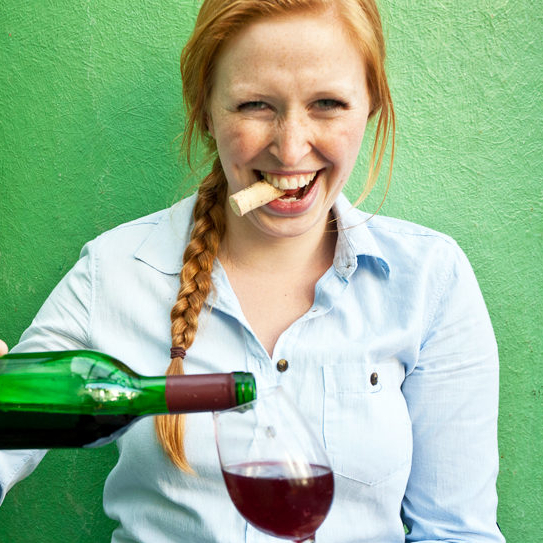
Julia Baltes
Weingut Bertram-Baltes
Born on Christmas Eve in 1989, Julia Baltes (née Bertram) grew up in Dernau in the German wine region of the Ahr – one of the smallest and most northerly regions of Germany’s 13 official wine regions.
Wine was always a part of Julia’s life. Her family has grown vines and produced wine in the Ahr Valley for more than a century. She interned at the nearby Meyer-Näkel estate after graduating high school and went on to study viticulture and oenology at the acclaimed Geisenheim Institute in the Rheingau region. Soon after receiving her degree, Julia was elected the 64th German Wine Queen, serving as international ambassador for the German Wine Institute from 2012-2013 (Fun fact: Julia’s grandmother Rosemarie was elected Dernau’s wine queen in 1959!)
She then returned to the family business as the fifth generation to lead the estate, producing her first line of wines in 2014. Julia officially took over the estate from her mother and aunt in 2017 and transitioned to organic viticulture in 2019.
Today, Julia and her husband, Benedikt Baltes, run the family estate together. Benedikt is also a winemaker from the Ahr with a similar passion for Pinot Noir. He currently splits his time between the Bertram estate and Weingut Steintal – formerly Stadt Klingenberg – in Franken.
With Benedikt joining the Bertram family estate, Weingut Julia Bertram officially changed its name to Weingut Bertram-Baltes in March 2020.
Carole Lecourt
Château Lecourt Caillet
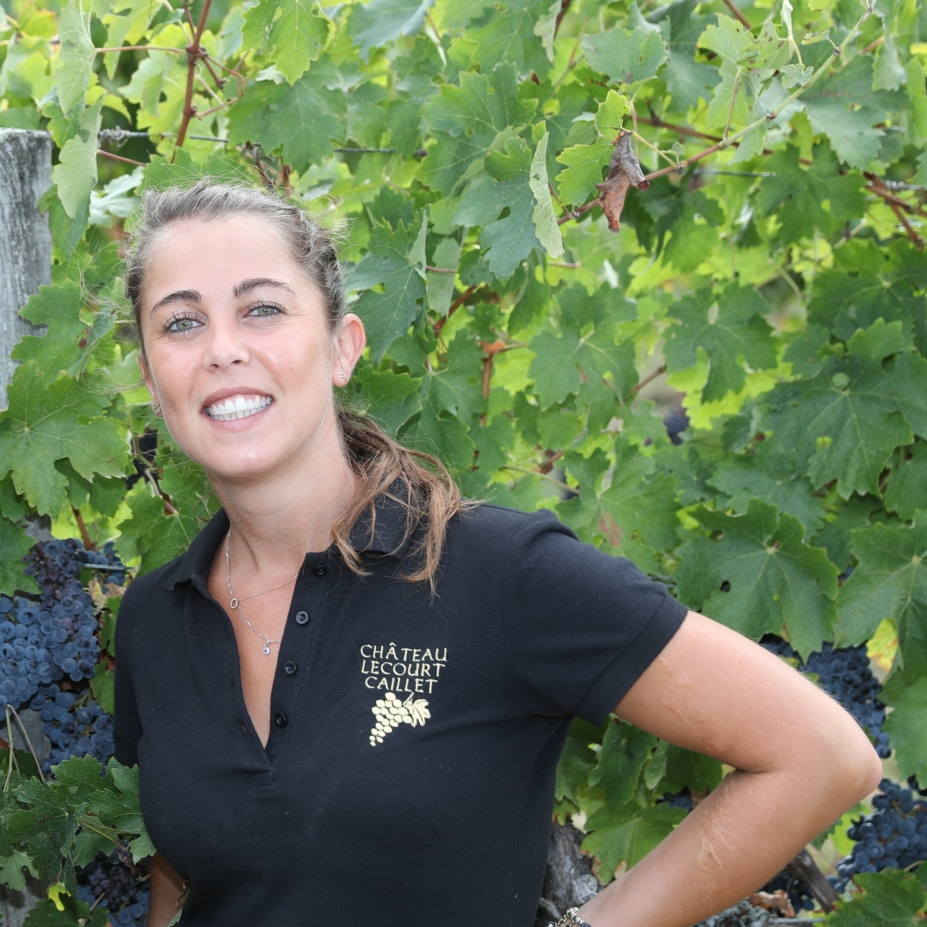
Carole Lecourt
Château Lecourt Caillet
Marketing, Communication, Events and Procurement Manager
Carole Lecourt is young, versatile, and comes from a noble line of winemakers at Château Lecourt Caillet. Not afraid to get her hands dirty, Carole is equally involved on the farm, in the vineyards and cellar, and mingling at events. With her deep family knowledge of wine, Carole has been an integral force in creating younger fans and drinkers of Lecourt wine with her label Rosé Princesse by Carole Lecourt.
Pierre Brunot
Clos La Petite Croix
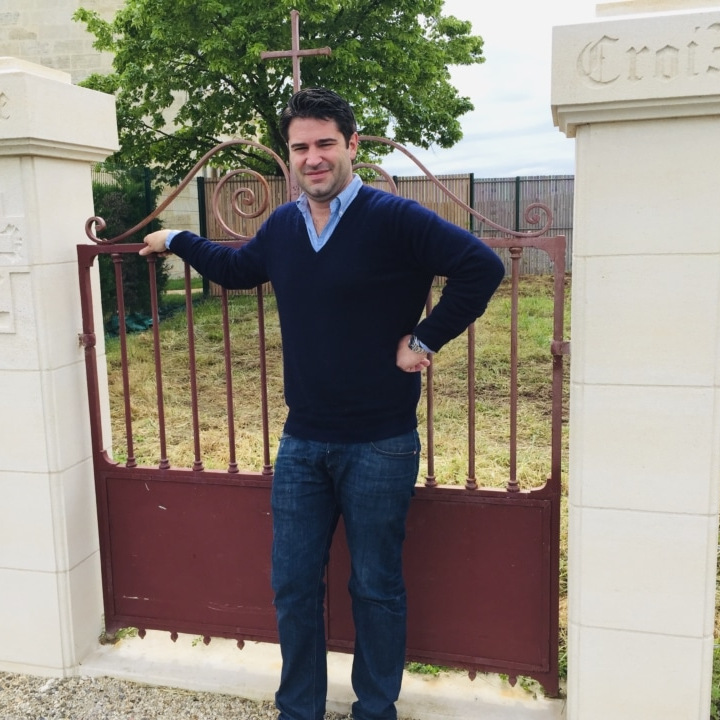
Pierre Brunot
Clos La Petite Croix
Since 2011, Pierre Brunot has been laser-focused on producing superior product from his 2,436 grapevines. Having learned the wonders of wine production from his grandfather on the very land he tends to now, Brunot’s experience and love of wine runs deep. In order to continue on the legacy of the vineyard, Brunot has enlisted the services of renowned oenologist and consultant, Emmanuel Villega. Early positive feedback on their collaborative vintages has validated his work, and he is paying equal attention to the label and packaging of his flagship product. Looking to the future, Brunot is opening a tasting room to greet visitors interested in discovering such a small, well-preserved terroir (0.38 hectares) that produces a truly home-grown wine.
Simona Maier
Weinmanufaktur am Heiligenstein
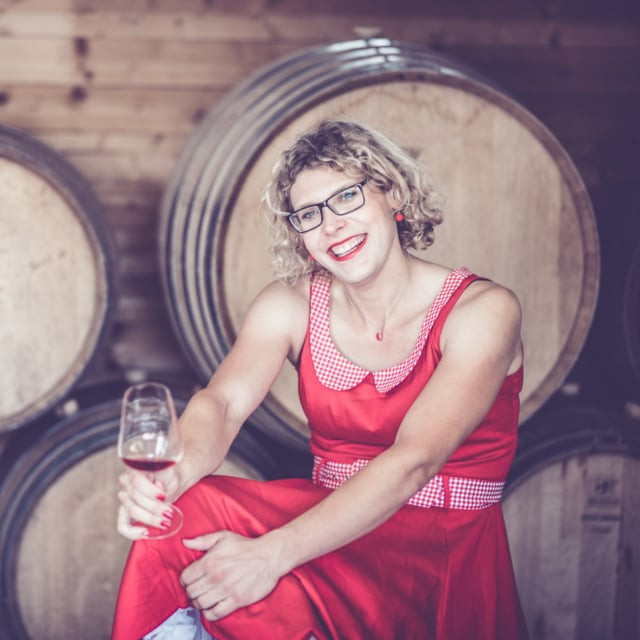
Simona Maier
Weinmanufaktur am Heiligenstein
Simona Maier is an accomplished young, transgender winemaker in the Baden region, just finishing her term as local wine princess. Her father worked in grape production, and her childhood was rich with memories of being in the vineyards. She began a winegrowing apprenticeship directly after graduating high school and won a national competition for Best Young Agrarian, receiving a diploma from Angela Merkel. Prior to transitioning, Simona won a national competition for Best Young Agrarian, receiving a diploma from Angela Merkel. She works part-time as a winemaker for a wine estate and spends the rest of her time building up her own estate near Heidelberg in the Baden region. She produces two sparkling wines called Rosa Liebe and Bunte Liebe (Pink Love and Colourful Love).
Philipp Freitag
Weingut Freitag
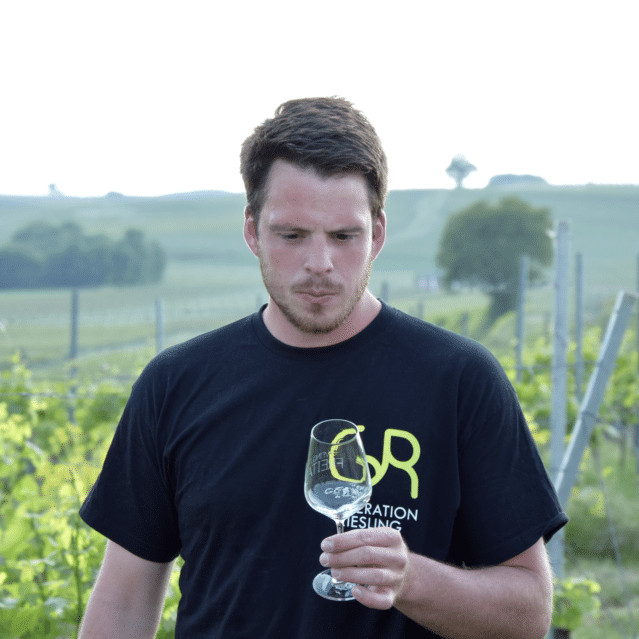
Philipp Freitag
Weingut Freitag
Philipp Freitag is the natural winemaker behind the viral hashtag #NakedFriday, which playfully borrows from the translation of Freitag, meaning Friday in German. Truly natural in all of his endeavors, each #NakedFriday post he publishes features the winemaker naked in the vineyards or in his wine cellar. New to wine, Philipp finished his viticulture training in 2016, and has since been named one of the best winemakers in the region of Rheinhessen. Philipp produces a line of “Casual Freitag (Friday)” and “Thank God It’s Freitag (Friday)” wines, ideal for casual drinking, and when you’re ready to “switch to Friday mode.” Philipp truly knows how to mix business and pleasure!
THE BIHLMEYER SISTERS
Weinschwestern (Wine Sisters)
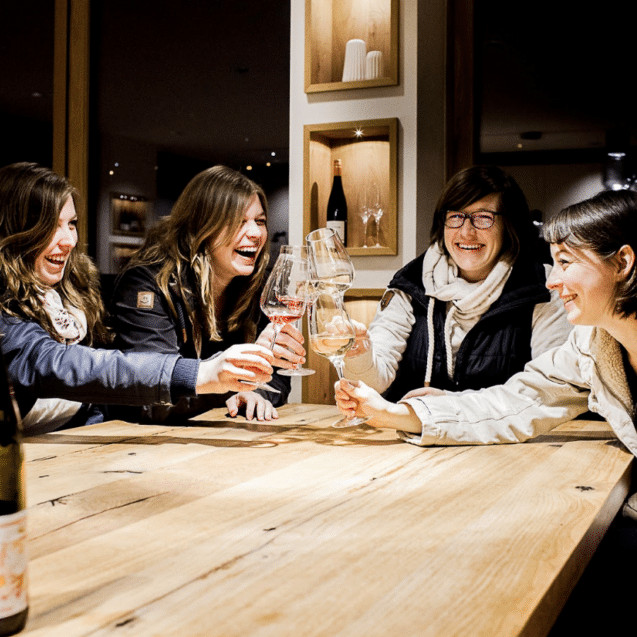
THE BIHLMEYER SISTERS
Weinschwestern (Wine Sisters)
Their story sounds like a modern fairytale: 4 sisters who grew up on a vineyard and one day, over a glass of wine, decided they would run it together and turn their family ties into a brand. Voilà! That’s how Weinschwestern, or Wine Sisters, was born. Amélie, Desiree, Beatrice and Cathryn Bihlmeyer all occupy different fields within the business and in the 9 years since taking over the estate from their parents, they have grown the company considerably, currently producing a total of 100,000 bottles per year. “Eat, Sleep, Riesling, Repeat” is not just the name of one of their wines, it’s also part of their life’s motto. They describe their wines as “uncomplicated, fragrant, refreshing and damn delicious,” the type of wine that will effortlessly carry anyone through a warm summer night.
Daisy Sichel
Château Angludet
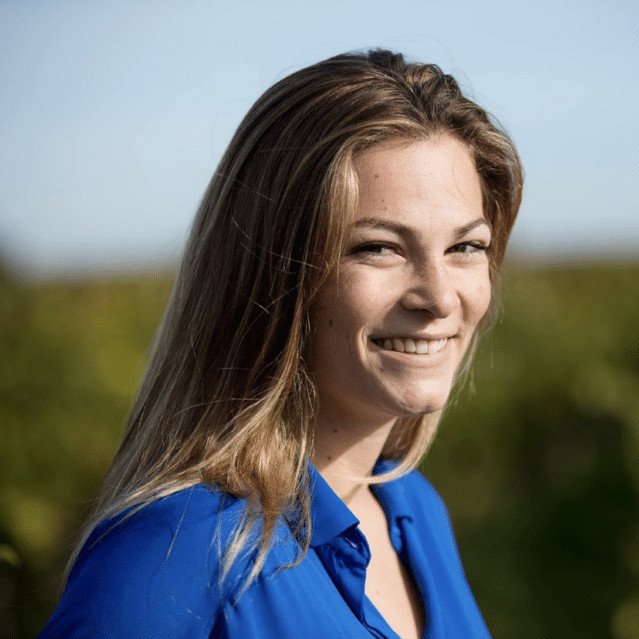
Daisy Sichel
Château Angludet
The best wine gets made when the knowledge and quality of long-standing soil and tradition meets the progressiveness of a young heart passionate to continue a family legacy. This is very much the case of Daisy Sichel whose family immigrated to Bordeaux from England in 1961, the year her grandfather Peter Sichel first purchased Château Angludet. The entire family has since been involved in the business and have pushed Château Angludet into the limelight as one of Margaux’s most important vineyards. Daisy herself is the 7th generation of winemakers in the Sichel family. When she speaks of the estate’s wine, she sometimes refers to it as “magic liquid,” no doubt a sign for someone who lives and breathes for their craft.
Paul-Arthur Bardet
Vignobles Bardet
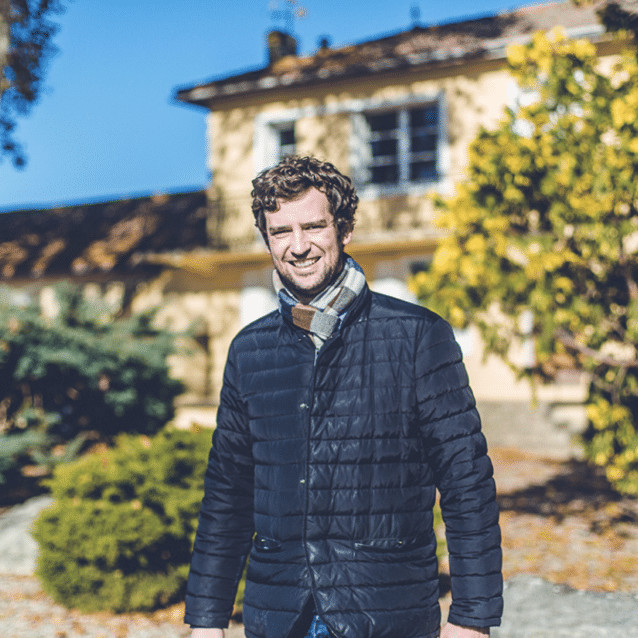
Paul-Arthur Bardet
Vignobles Bardet
The world-renowned village of Saint Émilion is home to some of the finest wines coming out of Bordeaux. It’s also where Paul-Arthur Bardet grew up on his family’s vineyard. First established in 1704, the Bardets look back on an impressive history of making wine. These days, the estate produces over 300,000 wines per year. Fun fact for Game of Thrones fans: the fictional Dornish wine characters like to drink on the series was turned into reality by these savvy winemakers, after Paul-Arthur’s brother, a die-hard GoT fan, had the idea of turning the legendary drink into an actual product.
Niko Brandner
Griesel & Compagnie
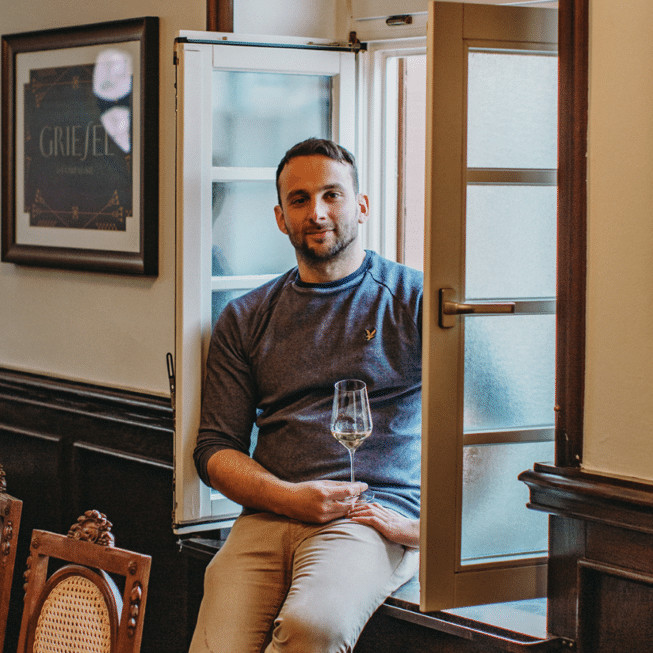
Niko Brandner
Griesel & Compagnie
Niko Brandner is proof that one doesn’t need a family in the wine business nor many years of experience to start one’s own wine brand and lead it to success. Niko was a young banker in Frankfurt when he realized that wearing suits and working 9-5 every day was not enough for him. He was 25, successful and miserable. It was then and there that he decided he would go into wine-making. He studied viticulture for 3 years and was subsequently offered a job running the sparkling winery Griesel which he has since turned into one of Germany‘s most eminent Sekt (sparkling wine) producers.
Eva Fricke
Weingut Eva Fricke

Eva Fricke
Weingut Eva Fricke
Eva Fricke hails from Bremen in the north of Germany, far away from the country’s wine growing regions. She grew up with parents who were both doctors, so wine seemed an unlikely path for Fricke. She decided to take up viticulture after being inspired by her grandmother, and soon found herself working on wine estates in Australia, Spain, Italy, and Germany before she hired a small vineyard of 0.25 hectares. Taking a hands-on, DIY approach, she virtually made her first wine in a garage. Her passion, expertise, and production has grown exponentially since then. Today, she has her own wine-estate in Rheingau with 10 hectares. Though not from Rheingau, Fricke has loved the challenge of the land, and has always “believed in the potential” in the region.
Sandrine Garbay
Château d’Yquem
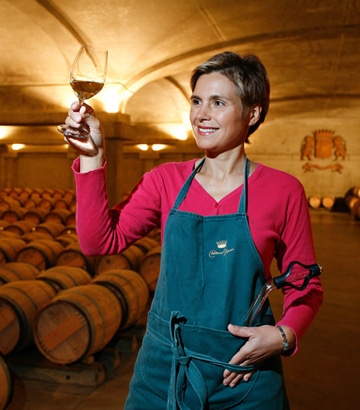
Sandrine Garbay
Château d’Yquem
With a degree from the Bordeaux Institute of Oenology, Sandrine Garbay earned the admiration of her peers by climbing the ranks to become cellarmaster at Château d’Yquem, a superior producer of sweet white wines. While she witnesses more women entering the profession—a dozen women are currently cellarmasters in Bordeaux—Sandrine Garbay remains the only one in charge of a first grand cru classé. Her favorite vintages from Yquem are unexpected, at best: 2002 or 2004. “‘They’re not famous Sauternes vintages, but they give me most satisfaction because they were so difficult,” she says. It is that very dedication to hard work that has led Garbay to achieve greatness at Château d’Yquem.
Malika Faytout-Boueix
Château Lescaneaut
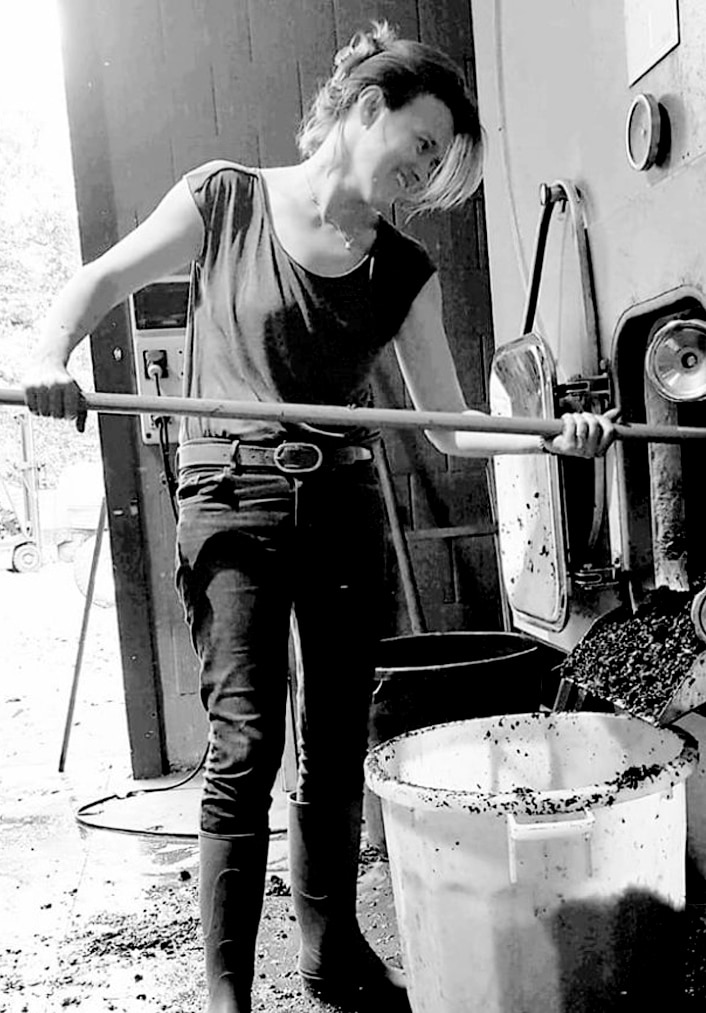
Malika Faytout-Boueix
Château Lescaneaut
Wine has always been part of Malika Faytout’s life story. With a lineage in winemaking that goes back six generations, Malika, born in Lescaneaut, is the eldest daughter of François Faytout, who worked the vineyards until 2001. Malika married Pascal Boueix in 1997, who, after completing his training as an architect, enthusiastically took on the study of viticulture and oenology. Pascal took the reins of the wine estate in 2002 and has since focused on natural wine that is mindful of the terroir. A graduate with a Doctorate in Psychology, a DUAD, and proud mother of three children, it is alongside Pascal that Malika returns to her first passion: wine.